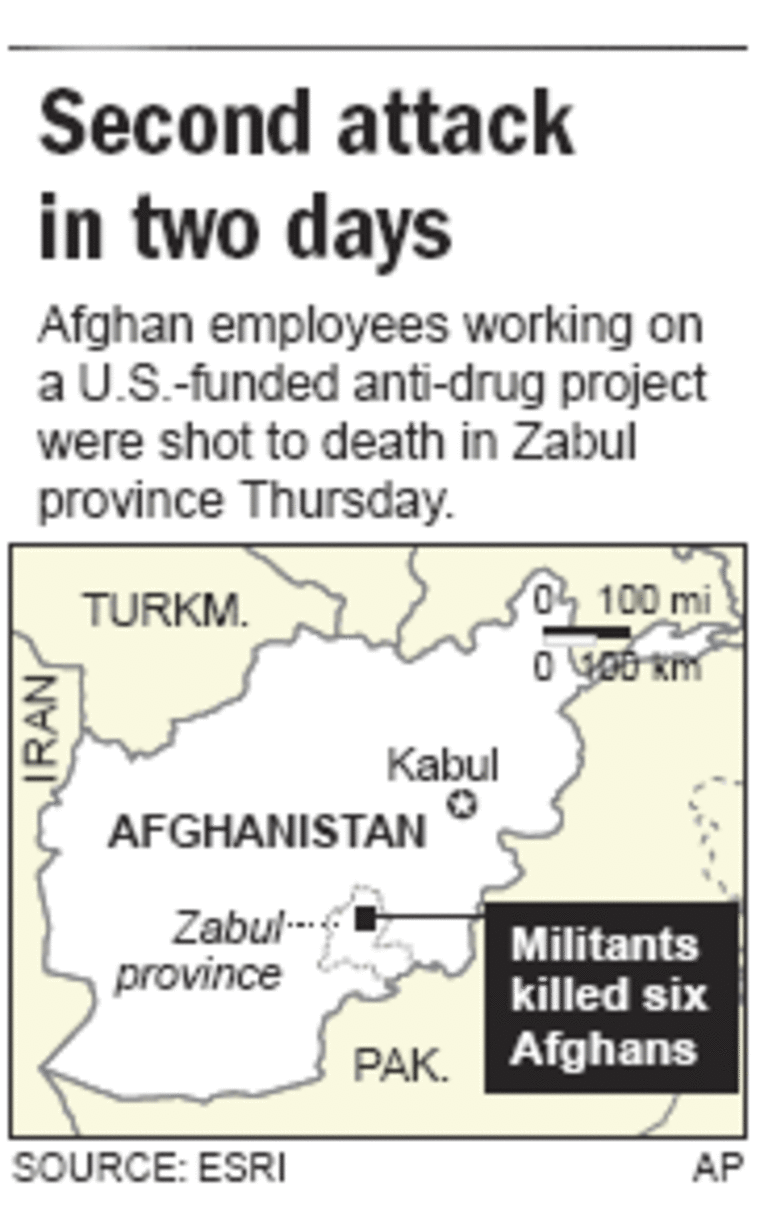Suspected Taliban militants gunned down six Afghan employees of a U.S.-funded anti-drug project in southern Afghanistan on Thursday, the second fatal attack on project staff in two days, officials said.
The victims were driving to Kabul with the body of one of five men killed in Wednesday’s attack when they were ambushed in Zabul province’s Shahjoy district, said Naik Mohammed, a doctor at a hospital in Qalat, where the victims’ bodies were taken.
Two of the six Afghans killed Thursday were employees of Chemonics International Inc., a Washington-based consulting firm, the company said. Five of the victims in Wednesday’s attack also worked for Chemonics, a contractor for the U.S. Agency for International Development.
The victims of Thursday’s attack included two relatives of those killed Wednesday and two rental car drivers, Chemonics said in a statement.
“The victims of these attacks are not just the people killed but all Afghan citizens struggling to rebuild their country and their lives,” said Chemonics president and CEO Ashraf Rizk.
On Thursday, State Department spokesman Richard Boucher extended “our deepest condolences to the families, the friends and the colleagues of the victims of both incidents.”
“Chemonics has advised the U.S. Embassy in Kabul that it is withdrawing personnel from southern Afghanistan, and taking a careful look at the security situation,” he said. “We will be helping the Afghan authorities with their investigation of this incident, as well as yesterday’s.”
‘Narco-state’ fears
Chemonics is managing a project sponsored by the U.S. Agency for International Development to provide alternative livelihoods to farmers so they don’t grow opium, the raw material for heroin. The project employs tens of thousands of Afghans to build roads, dig irrigation ditches and do other public works jobs.

Afghanistan last year produced nearly 90 percent of the world’s opium, sparking warnings it is fast becoming a dangerous “narco-state” less than four years after the U.S.-led invasion ended its role as a haven for al-Qaida.
The United States and other countries are pumping hundreds of millions of dollars into Afghanistan to fight the trade. But efforts to eradicate opium poppy crops and raid heroin laboratories this year have sometimes triggered a violent response from drug producers.
Ali Khail, spokesman for the government in Zabul province, where Thursday’s attack occurred, blamed Taliban militants for the killings. Officials also blamed the insurgents for Wednesday’s assault, about 150 miles away in Helmand province.
Taliban remains active
Though the officials offered no evidence to support their claims, Taliban-led militants have been active in the area for the last three years despite intensive U.S. military operations. Militants have targeted aid and reconstruction workers to undermine recovery under the U.S.-backed government, which replaced the hardline militia.
At the scene of Thursday’s killing, some of the victims’ shoes and clothes lay sprawled in a pool of blood on the road. Two policemen stood guard at the site of the ambush near an old rundown bridge where drivers are forced to slow down.
The kidnapping Monday in Kabul of Italian Clementina Cantoni, 32, also has added to security fears of relief groups helping rebuild in Afghanistan.
Hundreds of police fanned out across poor neighborhoods of the city searching for the CARE International worker, whose purported kidnapper threatened to kill her Wednesday night unless authorities met his demands for more Islamic schools, more aid for opium farmers and the removal of a liberal radio show from the airwaves.
No word on CARE worker's fate
The caller, who gave his name as Temur Shah, later told independent Afghan Tolo television station that he had extended the deadline to Thursday afternoon.
Police said they had no information on Cantoni’s fate.
Authorities have said they suspect the kidnapping was the work of the same criminal gang accused of abducting three U.N. workers last year. They were released a month later.
Cantoni’s abduction, which has caused anguish across Italy, follows several attacks on foreigners in the capital, long regarded as one of the safest places in the country.
On May 7, a suicide bomber blew himself up in an Internet cafe, killing a U.N. worker from Myanmar. Last month, an American civilian was abducted but escaped by throwing himself from a moving car.